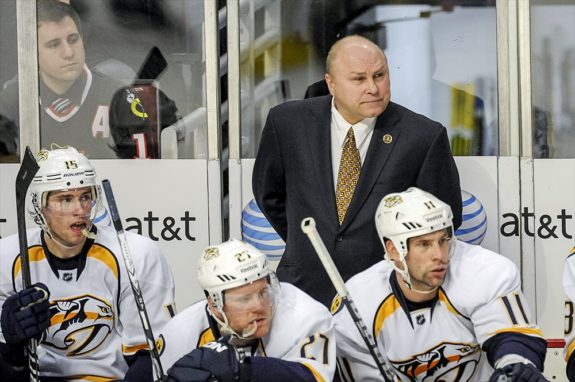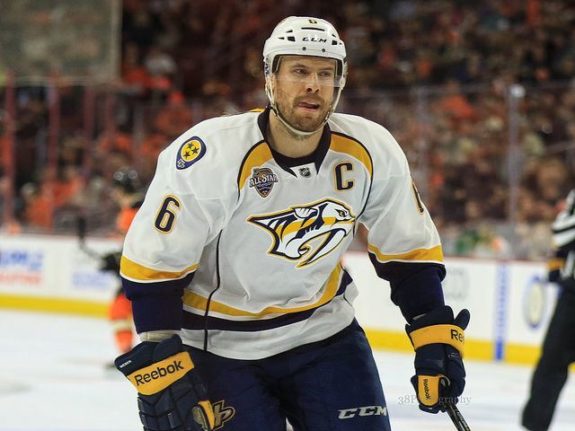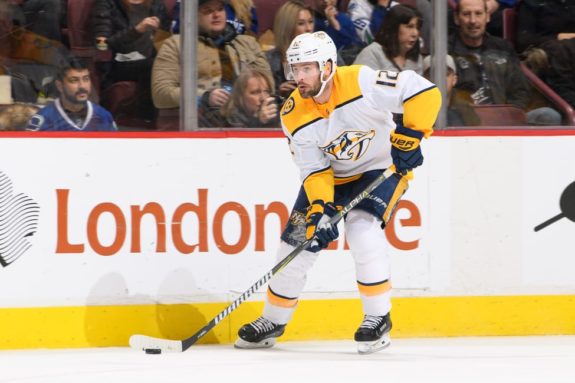The Nashville Predators have been a fun team to watch since they joined the league. From their brightly coloured jerseys to the acquisition of All-Star players, their journey to the big leagues is one for the ages.
The Early Years
In 1995, the city of Nashville gained interest in the NHL market. Rumours were circulating that the New Jersey Devils would be relocating to the planned Nashville arena. Nashville offered a $20 million relocation bonus to any team that would relocate; the Devils attempted to terminate their lease with the New Jersey Sports and Exposition Authority (NJSEA), but instead of moving, they restructured and stayed in New Jersey.
Related: Predators’ 3 Best & 3 Worst Trades All-Time
In January of 1997, a group led by Craig Leipold made a formal presentation to the NHL requesting an expansion franchise. When Gary Bettman went to tour the arena, they were greeted by thousands of people- future Predators fans.
In June of 1997, the NHL granted a conditional franchise to Nashville, Columbus, Atlanta and Minneapolis-St.Paul. The condition was that Nashville could participate in the 1998 season if they sold the league-mandated 12,000 tickets before March 31st, 1998. Out of the four cities awarded teams that year, Nashville was the only city with a completed arena; therefore, they started playing first.
On September 25, 1997, Leipold and the team president Jack Diller held a press conference where they unveiled the team’s new logo, a sabre-toothed cat. Once the logo was released, the franchise held a fan vote to determine the team name. The 3 potential names selected from the 75 that were entered were “Fury,” “Attack,” and “Ice Tigers.” Leipold added his own submission to the vote, which was “Predators.” During a press conference on November 13th, 1997, it was revealed his submission won, and the team would be known as the Nashville Predators.
On Oct. 10, 1998, the Predators played their first game as an NHL expansion franchise. Although they lost 1-0 to the Florida Panthers, their losing streak didn’t last long. On October 13th, they secured their first victory three nights later, beating the Carolina Hurricanes 3-2.
In 2001-02, they locked down their 100th win. This iconic moment came on Dec. 6, 2001, against the Ottawa Senators in a 4-2 Predators win, to set an NHL record as the second-fastest expansion team of the 1990s to reach that milestone. In the 2002-03 season, the Predators made a “Playoff Pledge,” which was a guaranteed playoff appearance or the price increase for season tickets in the 2002-03 season would be refunded; they did not make the playoffs.
Nashville failed to make the playoffs in their first 5 seasons in the NHL. However, in the 2003-04 season, after finishing 8th in the Western Conference, they got their first taste of the postseason, ultimately losing to the Detroit Red Wings in 6 games during the first round.
The Predators’ first head coach also set an NHL record in the team’s early years. Barry Trotz, who coached the team for 16 seasons until 2014, broke the record for coaching the most games as an expansion team’s original coach in 2002-03, with 392 games.
After the Lockout
After the 2004-05 NHL lockout, the Preds continued to improve. In 2005-06, they set a record by winning their first four games by a single goal; no team achieved this accomplishment before them. They also reached their first 100-point season to earn home-ice advantage in the first round of the playoffs for the first time in franchise history. They closed out the regular season with the NHL’s best home record, where they went 32-8-1. However, they were once again eliminated in the first round of playoffs, this time by the San Jose Sharks in 5 games.

In 2007, they landed an All-Star in Peter Forsberg via a trade with the Philadelphia Flyers. The Predators sent Scottie Upshall and Ryan Parent, who were two former first-round picks, and the Predators’ first and third-round selections in the 2007 Entry Draft. Forsberg had a short stint with the Predators but managed to garner 15 points in 17 games. This acquisition was intended to help boost the Predators’ playoff run that season, although they lost in the first round of the playoffs to the Sharks again that year.
However, as the saying goes, what goes up must come down, and the 2007-08 season was one to forget. Poor ticket sales and a lack of community support led to rumours that the prospective new owner, Jim Balsillie, a telecommunications mogul, had plans for the Predators to leave Nashville and head to Hamilton, Ontario. (from ’10 years after Predators nearly left town, Nashville celebrates Stanley Cup Final,’ Tennessean, 05/24/2017) These rumours loomed over the team until up until mid-way through the 2007-08 season. Their season was capped off with a first-round playoff loss for a fourth straight season by the Red Wings in 6 games.
Iconic Players
Nashville’s first captain was Tom Fitzgerald, who was drafted 17th overall by the New York Islanders’ in the 1986 NHL Draft. He played four seasons with the Islanders before being selected by the Florida Panthers in their expansion draft in 1993. He went on to play five seasons with the Panthers before he was acquired in 1998 by the Predators for his veteran leadership and presence. His league experience and veteran nature ultimately led to his captaincy, a role he held from 1998-2002.
On Oct. 9, 2003, Jordin Tootoo made his NHL and Predators debut; this made him the first player of Inuit descent to play in the NHL. He was drafted 98th overall in the 2001 NHL Draft by the Predators, and he played 486 games in eight seasons with the team. He earned his first NHL point against the St. Louis Blues on October 16th, 2003, with an assist on Dan Hamhuis’ goal.
The Predators also drafted Shea Weber, their future face of the franchise, 49th overall in 2003. Weber made his NHL debut with the team on January 6th, 2006, against the Red Wings. He played 763 games in the gold and blue and scored 166 goals in his 11 seasons. On July 8th, 2010, Weber was named the team’s fifth captain, taking over from Jason Arnott, who was no longer a Preds member.
Shea received votes for the Hart Trophy (league MVP) on 5 occasions and for the Norris Trophy (best defenseman) 11 times, including twice finishing second. In 2016, Weber won the Mark Messier Leadership Award over Alexander Ovechkin and John Tavares. This award exemplifies great leadership qualities both on and off the ice throughout the regular season.
Shockingly, Weber was traded on June 29, 2016, to the Montreal Canadiens for P.K Subban, with both guys in their prime.

Another standout player who wore the blue and gold was Mike Fisher. Fisher was drafted 44th overall in 1998 by the Senators. On February 10th, 2011, he was traded to the Predators in exchange for the Preds’ first-round pick, Stefan Noesen, and a conditional pick in 2012 (Jarrod Maidens). The conditions were that if the Preds won a playoff series, the Senators would get their third-round pick, and if they won two or more series, the Sens would be entitled to the Preds’ second-round pick. They won their first series against the Anaheim Ducks but lost in Round 2 to the Vancouver Canucks, meaning the Senators only got a third-rounder.
Related: Predators – Revisiting the Kevin Fiala/Mikael Granlund Trade
He was named the team’s 6th captain on September 7th, 2016, taking over from Weber, who was traded to Montreal. In that 2016-17 season, he led the team to the Stanley Cup Final, where they lost to the Pittsburgh Penguins in 6 games.

On August 3rd, 2017, Fisher announced his retirement, becoming the first captain to retire with the team. Surprisingly, on January 31st, 2018, he announced he was leaving retirement behind to help the Preds make another run to the Stanley Cup. He signed a one-year deal with the Preds on February 26th, 2018. Unfortunately, they did not make it as far as they did the year before, and on May 12, 2018, just a few days after their second-round elimination courteous of the Winnipeg Jets, Fisher announced his re-retirement.
The Past Legacy Trickles into the Future
Throughout the years, Nashville has had some notable names on their rosters and has made a name for themselves in the NHL. As the upcoming season approaches, I look forward to watching how the legacy of the past players and historical moments for the team motivate the current and new players to continue to break records and keep the Smashville legacy strong!